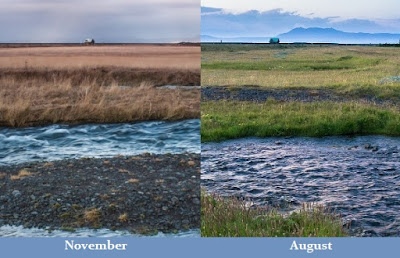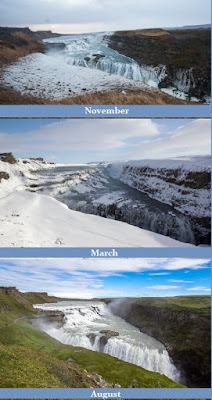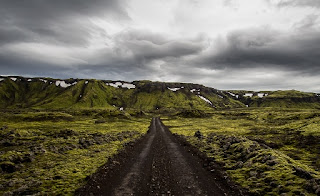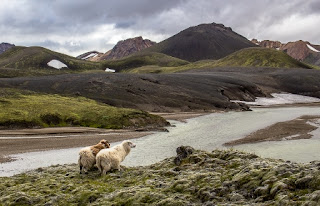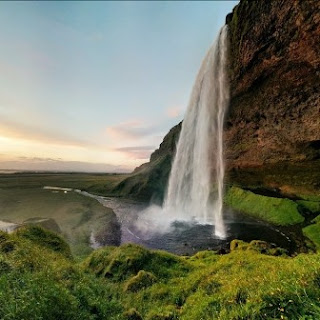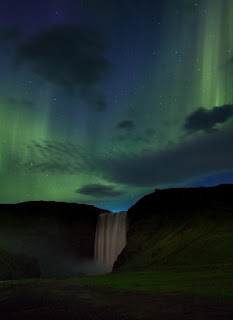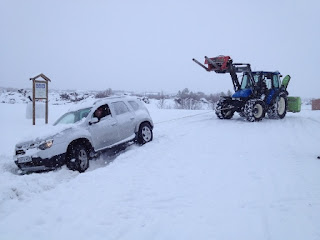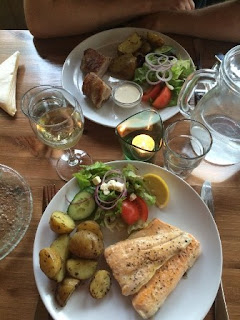In order to share my experience of visiting Iceland in winter, I would like to show some pictures and itineraries of two winter trips: one in November on the South coast and the other in March on the North coast.
Day 1 & 2: Blue Lagoon (tip #1: do not leave your towel outside, it will freeze! tip #2: book your ticket in advance) and Golden Circle, the weather is terrible (a lot of wind and rain) but we have beautiful rainbows everywhere.
Day 3: We see the famous falls Seljalandsfoss and Skogarfoss. The big difference with summer is that we’re the only tourists and there’s no long line to walk behind Seljalandsfoss! (but it’s very slippery).
We don’t go to sleep: we cannot detach our eyes from the dancing northern lights, which appear on every side of the sky!
Day 5: The good news about winter light is that it’s almost always sunrise or sunset (daylight is between 9am to 5pm). After Jökulsárlón’s beach, we take a guided walk on Vatnajökull glacier, and hike to see Svartifoss.
Day 6: We drive from Kirkjubæjarklaustur to Selfoss and stop at Vík. Since it’s been snowing during the night, the landscapes look very different!
Day 7: We spend our last day around Reykjavik, Seltún and Hvalfjörður for a last colorful sunset.
Trip 2 (March) – North Coast
Day 2: We stay along the fjord next to Akureyri and visit the herring museum in Siglufjörður. The clouds are low but the landscapes are still impressing.
We enjoy the outdoor swimming pool of Akureyri under the snowflakes, and are lucky to see northern lights from 2am to 5am!
Day 3: We drive to Myvatn, and are surprised not to see any lake… it is completely frozen! We find a wonderfully warm water in Myvatn Nature Baths though (bring a hat and a beer if you want to do as local people do).
Day 4: We decide to walk to Krafla, the caldera and lava field; however 2 meters of snow cover the paths! I would not recommend this walk in winter because snow can be tender because of the steam of the lava field, creating holes that you can’t foresee. We were also caught in a sudden snow storm and had a hard time walking against the wind and seeing each other.
Day 5 & 6: We head back to Reykjavik, stopping in Vatnsnes peninsula to see seals. We are lucky because the road conditions get worse around Akureyri and a portion of the road is closed the next day!
To summarize: landscapes
As you have seen, the colors are really different in fall, winter, and summer. I found the three atmospheres quite interesting, here are comparisons:
Other pictures of Iceland in August:
Driving
Road 1 was a bit tricky around Myvatn in March because everything was white and you had to spot the yellow poles to know where the road was (not easy on the second picture!).
And even if we had a 4wd in March, it didn’t prevent us from ending like this because we couldn’t distinguish the road from the shoulder!
Clothing
You will never be too warm in Iceland! It was around 0°C (32°F) during the day and -8°C (16°F) during the night, but the wind makes you feel much colder. Prepare to bring ski clothes: tights and waterproof trousers, layers of warm clothes and fleece jacket, water and windproof jacket, scarf, gloves, hat covering ears, waterproof boots… and a swim-suit!
Food
There are not many restaurants and shops outside Reykjavik… but if you plan accordingly you can eat very well in Iceland. Try having food supply in your car to make sandwiches during the day, and ask the B&B or hotel where you’re staying to prepare a hot dinner for you (arctic char, meatballs or lamb are delicious).
To conclude: beautiful colors and landscapes, nobody around, and a little adventure… Winter made me fall in love with this country! To see other pictures of my travels.
Catherine Kungler Kherian



























